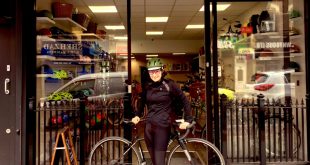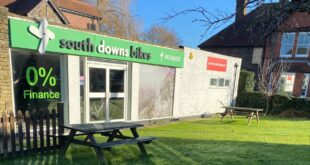Ex-scientist Paul Higginson, joint owner of SP Cycles and Torm with Alan Parkinson, tells Rebecca Morley why they now run a bike shop.
Paul Higginson and Alan Parkinson, joint owners of SP Cycles and Torm, are ex-corporate scientists who now run a local high street bike shop on the East Kent coast in search of a more ‘fulfilling life’. They also make and sell high-quality merino Sportwool jerseys that they sell at an affordable price as a way of keeping the shop open.
The shop is called SP Cycles and the jerseys are Torm, and the pair’s motto is ‘small is beautiful’. “Our background has been working in large corporations, and we thought about how we could make our lives more fulfilling,” Higginson says.
The shop was opened about nine years ago, and even though it was a boom time in cycling, according to Higginson, he says it was still very difficult to compete. “There wasn’t a level playing field between what we can get products for compared to what other people can.
“There were numerous examples where people would phone us up and ask if we had a part or something and we couldn’t buy it from our suppliers for the price they could get it for online. Having a repair service here was positive but there were certain things that were difficult to be competitive on.”
He continues: “We made a significant organic decision and that we would not go to funding anywhere, we would build it ourselves, with our own money, and we wouldn’t over-stretch ourselves. We would never put ourselves in a position where we were hoping that something would happen. There was an approach there, a business plan that we felt was true to what we were trying to do.”
Higginson and Parkinson were previously both scientists working in large corporations, and it is because of this that Higginson says they needed it to be ‘not about the money’. “If that was simply our objective, we might as well have just stayed where we were, doing what we were doing. A lot of the decisions that we made have been based around making sure that it’s what we want to do.”
So what kind of decisions were they? “Everyone has a vision of what they would like a company to look like, in terms of a bike shop. There are aspects of the decor that we couldn’t do at the start. We had to take it slowly, with the unfortunate need to say to people: ‘I’m sorry we don’t have that at the moment. I’m sorry we don’t have that stuff available right now, but we can get it for you.’
“What we learnt after a short period of time was that the majority of customers come to you for convenience. They want it straight away, and very few of them would wait if they were told they would have to because they know they can get it delivered to their house from the internet.
“We slowly had to build up stock, trust and loyalty, and getting the business looking nice and pleasant. We have this sense that we are always going to be the greasy independent local bike shop. The workshop is upfront in the shop, it’s not hidden out the back, so people can see what we’re doing. That’s the kind of approach that we wanted.”
Because of this, the workshop side of the business is quite an important part of its offering, as Higginson says that the shop aims to supply what it believes are ‘core cyclists’ – people who are passionate about cycling, or need a bike as a vehicle because they don’t drive. This was because it wanted to serve the local community, and a big part of the business has been about repairing bikes and servicing them so people can stay on the road.
“If we know people then we’re more than happy to, if we can’t fix their bike, say: ‘Well here’s one you can borrow for a couple of days, we’ll get you all sorted.’ That sense of community is what we wanted.”
Higginson says customers have responded positively, and feel a sense of community as well. “To blend in this feeling with the Torm stuff we do, what we felt we wanted was to build it by word of mouth. We didn’t want to go out there and put slogans out about how great we were and try and catch business like that.
“We wanted people to tell other people that they had good experiences, and so we’ve never done any significant level of advertising. The feeling was to let people decide for themselves how much they enjoyed what we did for them, and tell other people that that’s been the case.”
Torm
Alongside running the bike shop, Higginson and Parkinson also sell Torm jerseys. “We wanted to be able to provide a kit that was modelled with a nice technical fabric, but was affordable,” Higginson explains.
“There were a couple of options on the market that were, for some people, out of reach. These larger companies were making these products, and because of their overheads, they were quite expensive. So we thought that by providing this product directly from the shop, there are no overheads. What we tried to do was provide this modern product at a price that people can afford. We haven’t got distributors, we’re not selling through other shops, we’re not selling through any big organisation.”
He continues: “You get to a point in your life where your vision of success changes, and so what we wanted to do was to make sure that the bike shop itself, our local bike shop, was the centre of it. The Torm product wasn’t put in place to replace that, it simply helps to keep that moving. You don’t want the tail wagging the dog.”
Scientist backgrounds
Higginson and Parkinson worked in different industries as scientists, Higginson himself in pharmaceuticals. “You start as a scientist, wanting to do experiments, but then you get promoted out of that.
“You go into a people management position and then to an executive position, and then you kind of think to yourself: ‘Hang on a minute, I’m in a position now where I’m seeing how things operate and do I really want to be a part of it?’”
He says his and Parkinson’s paths crossed at the same time, in terms of date and where they were in their lives, which is how it all came about. The shop was opened about nine years ago, and it was about 18 months after that that we knew we needed something else to support it,” Higginson continues.
“The reason you’ve never heard of us up until this point is that we’ve never shouted about it, we’ve never needed to because our ‘small is beautiful’ philosophy has been what we’ve tried to live by throughout that period. Not everyone buys a lot of stuff, and that’s great because it’s a very durable and lasting product. Our philosophy isn’t just to get people to buy loads of stuff. It’s more a case of: ‘If you like it, it will last a long time.’”
Challenging times
Whilst the rise in online sales has proved a challenge for many brick and mortar retailers, with some even closing down as a result, Higginson says some of the challenges the business has faced recently have been down to ‘a little bit more than that’.
“I think there’s a saturation process as well, so just like any life goal or hobby choice, you’ll get into it in an interested and passionate way.
“You buy a product, you buy a second product, and at that point in time some people will feel satisfied, and some people will move away from it totally, and they’ll be others that want to keep going. So there is always a peak.
“As a business, you have to go with that peak, and so it has been harder recently in terms of bicycle sales, but that often gets replaced by people wanting to have their current one serviced and looked after because they’re not purchasing new ones.
“But definitely in terms of the products that we have in the shop, it’s very difficult to compete with the internet.” He concludes: “We’re not anti-big corporations, we’re not anti-people making money.
“But one of the decisions we made in life was that we wanted to earn money from good people, we wanted to spend money with good people, and that’s the reason that we’re trying to do it the way that we’re doing it.”
 BikeBiz Bicycle and cycling retail news
BikeBiz Bicycle and cycling retail news




